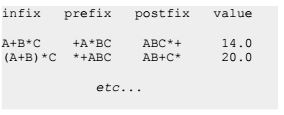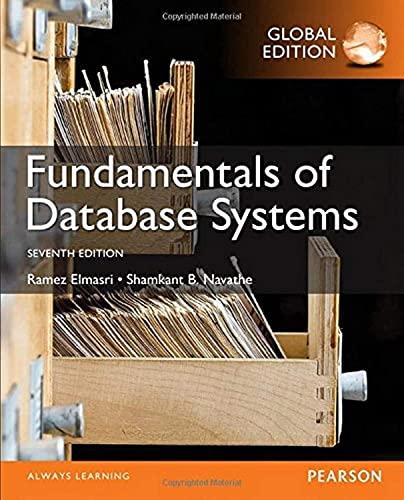Question
Write a C++ program for the question below. Please implement and use the codes that are given below. You are going to exercise your knowledge
Write a C++ program for the question below. Please implement and use the codes that are given below.
You are going to exercise your knowledge of stacks. First, look up and familiarize yourself with the STL stack class. You will use this class for this assignment.
1 - Infix to Postfix Implement the Infix to Postfix algorithm discussed in class: string infixToPostfix(string exp) This will take an infix expression as an argument, and return the corresponding postfix expression. Operands will be single upper-case letter, and operators will be *, / +, -. You may assume the input expression is correct. Your algorithm should skip over any blank spaces it finds.
2 - Postfix Evaluation Implement the Postfix Evaluation algorithm discussed in class. double evaluatePostfix(string exp) This will take a postfix expression of the form generated in part 1, and evaluate it as a double value. See below for the values of the operands.
3 - PostfixToPrefix You will implement an algorithm to convert from postfix to prefix. string postfixToPrefix(string exp)
The postfix to prefix conversion algorithm is as follows:
Create a stacks, S, of strings
Scan the postfix expression from left to right (skip over whitespace) If the character (ch) is an operand: S.push(ch) If the character (ch) is an operator, x = s.pop(); y = s.pop(); S.push(ch + y + x) (string concatenation) At the end, the resulting prefix string will be the only element in the stack.
Main Program Repeatedly: 1. Read an infix expression from a file (a single line), consisting of upper case letters and operators +, -, *, /, and possible blank spaces. Assume the expression is correct. 2. Invoke the infixToPostfix function to create the corresponding postfix expression. 3. Invoke the postfixToPrefix function, passing the postfix expression generated in step 2, to create the corresponding prefix expression. 4. Invoke the evaluatePostfix function, passing the postfix expression generated in step 2, to evaluate the expression. Assume the following operand values (this may be hard-coded): A: 2.0 B: 3.0 C: 4.0 D: 5.0 E: 6.0
Use the following file of infix expressions for your run:
***NOTE: This file should be opened as a .txt file.***
A + B * C ( A + B ) * C A *( B + C * D )+ E A * ( ( E / B ) + C ) ( A B ) / C * ( D + E )
Output should look like this:

CODES:
.....................................
LinkedStack.cpp Codes:
......................................
#include // For assert
#include "LinkedStack.h" // Header file
LinkedStack::LinkedStack() : topPtr(nullptr)
{
} // end default constructor
LinkedStack::LinkedStack(const LinkedStack& aStack)
{
// Point to nodes in original chain
Node* origChainPtr = aStack.topPtr;
if (origChainPtr == nullptr)
topPtr = nullptr; // Original stack is empty
else
{
// Copy first node
topPtr = new Node();
topPtr->setItem(origChainPtr->getItem());
// Point to first node in new chain
Node* newChainPtr = topPtr;
// Advance original-chain pointer
origChainPtr = origChainPtr->getNext();
// Copy remaining nodes
while (origChainPtr != nullptr)
{
// Get next item from original chain
ItemType nextItem = origChainPtr->getItem();
// Create a new node containing the next item
Node* newNodePtr = new Node(nextItem);
// Link new node to end of new chain
newChainPtr->setNext(newNodePtr);
// Advance pointer to new last node
newChainPtr = newChainPtr->getNext();
// Advance original-chain pointer
origChainPtr = origChainPtr->getNext();
} // end while
newChainPtr->setNext(nullptr); // Flag end of chain
} // end if
} // end copy constructor
LinkedStack::~LinkedStack()
{
// Pop until stack is empty
while (!isEmpty())
pop();
} // end destructor
bool LinkedStack::push(const ItemType& newItem)
{
Node* newNodePtr = new Node(newItem, topPtr);
topPtr = newNodePtr;
newNodePtr = nullptr;
return true;
} // end push
bool LinkedStack::pop()
{
bool result = false;
if (!isEmpty())
{
// Stack is not empty; delete top
Node* nodeToDeletePtr = topPtr;
topPtr = topPtr->getNext();
// Return deleted node to system
nodeToDeletePtr->setNext(nullptr);
delete nodeToDeletePtr;
nodeToDeletePtr = nullptr;
result = true;
} // end if
return result;
} // end pop
ItemType LinkedStack::peek() const
{
assert(!isEmpty()); // Enforce precondition during debugging
// Stack is not empty; return top
return topPtr->getItem();
} // end getTop
bool LinkedStack::isEmpty() const
{
return topPtr == nullptr;
} // end isEmpty
................................................................
LinkedStack.h Codes:
................................................................
#ifndef LINKED_STACK_
#define LINKED_STACK_
#include "Node.h"
class LinkedStack
{
private:
Node* topPtr; // Pointer to first node in the chain;
// this node contains the stack's top
public:
LinkedStack();
LinkedStack(const LinkedStack& aStack); // Copy constructor
~LinkedStack();
bool isEmpty() const;
bool push(const ItemType& newEntry);
bool pop();
ItemType peek() const;
};
#endif
.......................................................
LinkedStackTest.cpp Codes:
.......................................................
#include "LinkedStack.h"
#include
using namespace std;
int main()
{
LinkedStack s;
cout
s.push(1);
s.push(2);
s.push(3);
s.push(4);
cout
cout
LinkedStack s2(s);
cout
cout
s.pop();
cout
s.push(5);
cout
s.pop();
s.pop();
s.pop();
s.pop();
cout
//s.peek();
}
............................................................
Node.cpp Codes:
............................................................
#include "Node.h"
Node::Node() : next(nullptr)
{
} // end default constructor
Node::Node(const ItemType& anItem) : item(anItem), next(nullptr)
{
} // end constructor
Node::Node(const ItemType& anItem, Node* nextNodePtr) :
item(anItem), next(nextNodePtr)
{
} // end constructor
void Node::setItem(const ItemType& anItem)
{
item = anItem;
} // end setItem
void Node::setNext(Node* nextNodePtr)
{
next = nextNodePtr;
} // end setNext
ItemType Node::getItem() const
{
return item;
} // end getItem
Node* Node::getNext() const
{
return next;
} // end getNext
........................................................
Node.h Codes:
.........................................................
#ifndef NODE_
#define NODE_
#include
using namespace std;
typedef int ItemType;
class Node
{
private:
ItemType item; // A data item
Node* next; // Pointer to next node
public:
Node();
Node(const ItemType& anItem);
Node(const ItemType& anItem, Node* nextNodePtr);
void setItem(const ItemType& anItem);
void setNext(Node* nextNodePtr);
ItemType getItem() const ;
Node* getNext() const ;
}; // end Node
#endif
infix prefix postfix value 14.0 20.0 (A+B) C ABC AB+C etc... infix prefix postfix value 14.0 20.0 (A+B) C ABC AB+C etcStep by Step Solution
There are 3 Steps involved in it
Step: 1

Get Instant Access to Expert-Tailored Solutions
See step-by-step solutions with expert insights and AI powered tools for academic success
Step: 2

Step: 3

Ace Your Homework with AI
Get the answers you need in no time with our AI-driven, step-by-step assistance
Get Started


